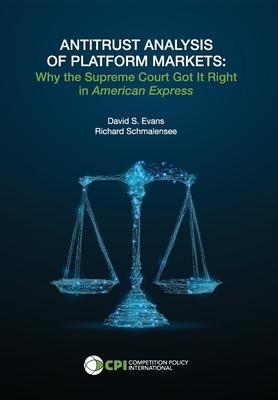Antitrust Analysis of Platform Markets: Why the Supreme Court Got It Right in American Express

Antitrust Analysis of Platform Markets: Why the Supreme Court Got It Right in American Express
This book explores the implications of the U.S. Supreme Court's ruling in Ohio et al. v. American Express, and the preceding litigation, for the treatment of multisided platforms under U.S. antitrust law. It is based on a series of articles that the authors wrote (either jointly or individually), leading up to and in the aftermath of the Supreme Court's decision.
The authors consider that the Supreme Court ruling provides valuable guidance for antitrust analysis in such markets. This book emphasizes the importance for enforcers and the judiciary to take full account of the multisided nature of certain markets, not only in payment services, but throughout the economy (including other types of multisided platforms, which are particularly common in online digital markets).
Although Evans and Schmalensee agree with the Supreme Court's reasoning, this book nonetheless sets out criticisms of the Supreme Court's ruling. The authors address such criticisms, based on our (and other legal and economic practitioners' and academics') understanding of the modern economic theories on multisided markets. In particular, Schmalensee underline the need for decisionmakers to take into account any alleged anticompetitive harm and benefits to participants on both sides of a multisided platform, before coming to any conclusion that there has been antitrust injury as a result of any given conduct.
Of particular importance, and emphasized throughout this book, is the need to undertake a full rule of reason analysis of conduct in multisided markets, consistent with both long-standing antitrust precedent and modern economic theory. A proper assessment must take into account the multisided nature of certain markets in all steps of antitrust analysis, whether the issue at hand relates to alleged monopolization, coordinated behavior, or a merger. Given the prevalence of multisided platforms, similar allegations of antitrust harm are sure to arise time and again in the years to come, and there are many unanswered questions.
For convenience, as Appendices, the books also includes the text of the U.S. Supreme Court's ruling, an amicus brief filed jointly by 28 antitrust professors, an amicus brief filed jointly by 8 economists, and the brief filed by the U.S. on behalf of the petitioners.
PRP: 330.58 Lei
Acesta este Prețul Recomandat de Producător. Prețul de vânzare al produsului este afișat mai jos.
297.52Lei
297.52Lei
330.58 LeiLivrare in 2-4 saptamani
Descrierea produsului
This book explores the implications of the U.S. Supreme Court's ruling in Ohio et al. v. American Express, and the preceding litigation, for the treatment of multisided platforms under U.S. antitrust law. It is based on a series of articles that the authors wrote (either jointly or individually), leading up to and in the aftermath of the Supreme Court's decision.
The authors consider that the Supreme Court ruling provides valuable guidance for antitrust analysis in such markets. This book emphasizes the importance for enforcers and the judiciary to take full account of the multisided nature of certain markets, not only in payment services, but throughout the economy (including other types of multisided platforms, which are particularly common in online digital markets).
Although Evans and Schmalensee agree with the Supreme Court's reasoning, this book nonetheless sets out criticisms of the Supreme Court's ruling. The authors address such criticisms, based on our (and other legal and economic practitioners' and academics') understanding of the modern economic theories on multisided markets. In particular, Schmalensee underline the need for decisionmakers to take into account any alleged anticompetitive harm and benefits to participants on both sides of a multisided platform, before coming to any conclusion that there has been antitrust injury as a result of any given conduct.
Of particular importance, and emphasized throughout this book, is the need to undertake a full rule of reason analysis of conduct in multisided markets, consistent with both long-standing antitrust precedent and modern economic theory. A proper assessment must take into account the multisided nature of certain markets in all steps of antitrust analysis, whether the issue at hand relates to alleged monopolization, coordinated behavior, or a merger. Given the prevalence of multisided platforms, similar allegations of antitrust harm are sure to arise time and again in the years to come, and there are many unanswered questions.
For convenience, as Appendices, the books also includes the text of the U.S. Supreme Court's ruling, an amicus brief filed jointly by 28 antitrust professors, an amicus brief filed jointly by 8 economists, and the brief filed by the U.S. on behalf of the petitioners.
Detaliile produsului










